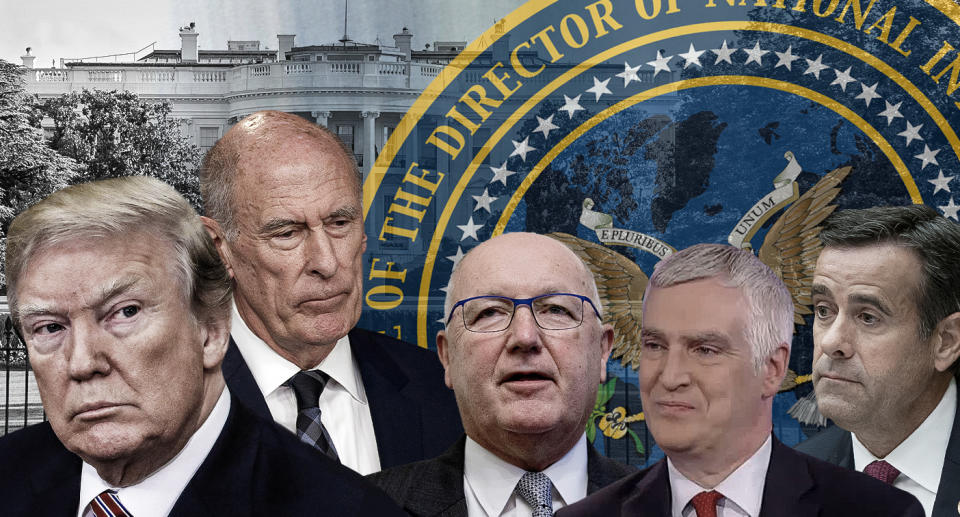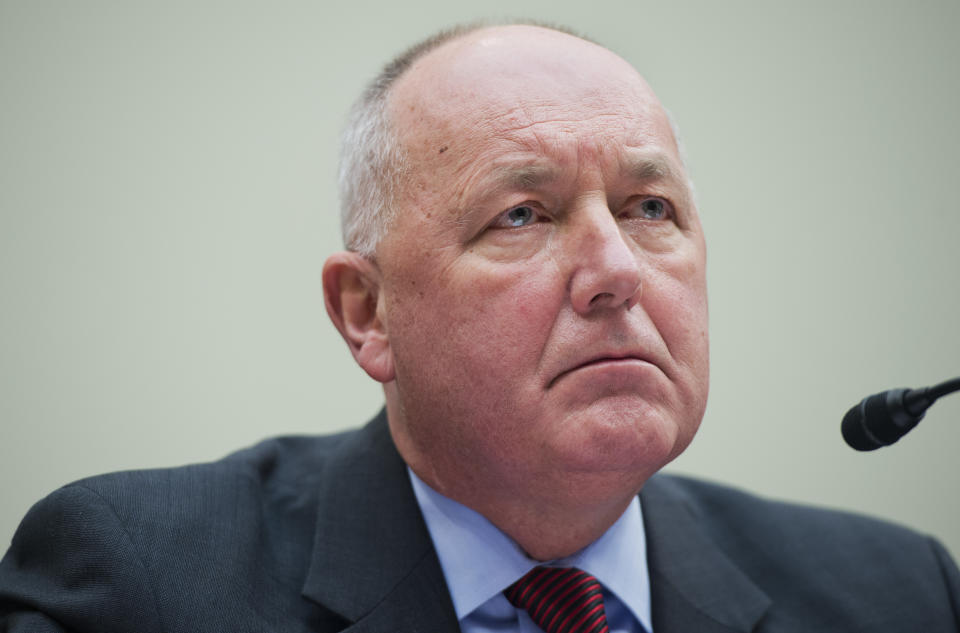White House vetting Trump loyalists to take over top intelligence job
WASHINGTON — Over the weekend, the Trump administration vetted multiple new candidates to take over the leadership of the intelligence community, and the contenders include outsiders seen as loyal to the administration and insiders who would be willing to “play ball” and work with the White House, according to sources who spoke with Yahoo News.
The search for a new intelligence chief comes after the ouster of Dan Coats, who announced his resignation on July 28 following a year of anonymous attacks and rumors of his departure. Congressman John Ratcliffe of Texas, Trump’s first pick to replace Coats, withdrew from consideration on Aug. 3 after news reports revealed that the former prosecutor had exaggerated his national security experience, which is a legal requirement of the job.

Top names being circulated to lead the community, either in an acting capacity or as a nominee, include Pete Hoekstra, the current U.S. ambassador to the Netherlands and the former chairman of the House Intelligence Committee, and Fred Fleitz, a former CIA analyst and congressional staffer who is a close ally to national security adviser John Bolton, according to two sources close to the White House. Kevin Meiners, a senior official in the Office of the Director of National Intelligence (ODNI) who previously worked on acquisition and technology for the office, is also being considered, according to a former intelligence official familiar with the vetting process. The White House didn’t respond to multiple requests for comment.
Jim Clapper, the former director of national intelligence under President Barack Obama, expressed concern about the succession plans for the office. “Instability and uncertainty are never a healthy state of affairs for any organization, especially one as large, complex and sensitive as the intelligence community,” said Clapper. “This is particularly so in this case, since the president has clearly telegraphed what he wants in his next [director of national intelligence] — a political partisan whose first priority is loyalty to him.”

The ODNI was created as a result of the 9/11 attacks when the intelligence community was criticized for failing to share important information that could’ve possibly led to the attackers being thwarted. The office controls the purse of the intelligence community, deals with technical matters across the community and houses top experts on different regions and threats, while coordinating communication between agencies. Recently, the ODNI created a separate office to deal exclusively with election security, and has served as the public voice for all the secretive agencies.
Over the course of his more than two-year tenure, Coats has served to shield staff from Trump, who has repeatedly criticized the work of the nation’s intelligence agencies and cast doubt on their conclusions. By publicly defending the intelligence community and its work, Coats has allowed colleagues like CIA Director Gina Haspel to play a low-key role.
For a number of months, the intelligence director’s office has been mired in confusion amid a lack of communication from the top and uncertainty over Coats. Now, with the future leadership of the community even more unclear, there is mounting concern about the functioning of the 17 agencies created to advise the president and key decision makers.
When Coats does leave on Aug. 15, it’s unclear what will happen. By law, Sue Gordon, Coats’s deputy, a career intelligence official, should take the helm, but the Trump administration is reportedly exploring ways to keep her from becoming acting director. Gordon has briefed Trump on occasion and has earned immense respect from both the intelligence agency veterans she helps lead and her congressional overseers. “You couldn’t find a more competent person to see ODNI and the community through this process,” said the retired senior military officer.
For now, however, the White House’s focus appears to be on finding a new permanent replacement for Coats.
Two sources tied to Trump told Yahoo News that both Fleitz and Hoekstra have already been interviewed for the role, but that additional contenders are being considered. “They looked at a lot of candidates over the weekend,” said one source close to the White House.
A former Trump campaign adviser said Hoekstra has had “several meetings” about the role over the last two months, and has a “good relationship” with the president after working on his campaign and serving as Trump’s ambassador in Holland. “There’s some synergy already there,” the former campaign adviser said.
Fleitz, who briefly served under Bolton at the National Security Council, also maintains a good relationship with the White House but may have more difficulty being confirmed, based on his right wing politics and association with anti-Muslim group and figures. The two sources tied to Trump said they did not know that Meiners, a career intelligence and defense official, was being considered, but were aware Fleitz and Hoekstra weren’t the only ones being interviewed.

Nevertheless, both sources argued that Trump is inclined to choose someone outside the intelligence community. “I’d be surprised if they gave it to someone like that,” the source close to the White House said of Meiners. “I think the president wants to go with an outsider.”
“His instinct’s not to trust the sort of internal vibe that exists in the intelligence community,” the former campaign adviser said of Trump. “He'd want to disrupt it.”
But two former senior intelligence officials said Meiners would bring important attributes to the job. “He will be steeped in the details of how the ODNI operates as well as the budget and administrative structures which make up the fabric of the [intelligence community],” said a former senior intelligence official familiar with the office’s operations. “Such knowledge would significantly improve his learning curve as DNI, were he to be selected.”
Meiners has built his career around expertise in the development and acquisition of highly technical intelligence collection systems, including drones and satellites. But intelligence community leaders have also selected him to lead a number of interagency working groups dedicated to producing a communitywide approach to solving “hard problems,” according to a retired senior military intelligence officer.
In addition to exposing him to other areas of the intelligence community, Meiners’s competence leading these groups means “he would have the respect of the current directors” of the various intelligence agencies, the retired officer said. “He’s been trusted by his bosses to take on difficult issues and hasn’t failed.”
Describing Meiners as “a consummate professional,” the retired senior military intelligence officer said he enjoyed a positive reputation across the intelligence community. “I’ve never had a negative experience with him, and I’ve never met anybody who’s had a negative experience with him,” the retired officer said.
Another former official also had praise for Hoekstra. The former lawmaker’s experience as chairman and ranking member of the House Permanent Select Committee on Intelligence between 2004 and 2011, as well as his current ambassadorial position will help him in understanding the work of the intelligence chief’s office, according to the former senior intelligence official familiar with ODNI operations. “However, it has been about eight years since he last served in an oversight capacity, and some of his understanding of the IC’s needs and activities may be dated,” the former senior intelligence official added.

While the chaos at ODNI has been damaging for the community, particularly because it represents the agencies on the Hill and at the White House, there is still debate from within the national security world about the office’s importance. Michael Hayden, who had previously led both the CIA and the NSA, laid out some of the skepticism about creating a director of national intelligence in his first book, and some, including Fleitz, see the office as an additional layer of bureaucracy with little actual power or influence. Trump at one point wanted to eliminate the ODNI altogether before realizing it would be politically difficult.
The director of national intelligence “doesn’t have teeth,” argued the former intelligence officer familiar with the interview process.
Trump’s relationship with the intelligence community has been contentious since before he was formally inaugurated. Coats, who was confirmed in March 2017 and had originally planned on staying for a year, managed to stave off external reorganizations of ODNI and help shepherd a reauthorization of foreign intelligence surveillance authorities through Congress, according to one congressional source familiar with the matter.
However, Coats made remarks at the annual Aspen Security Forum in 2018 where he contradicted the president’s comments about Russia meddling in the 2016 elections and expressed surprise about a possible White House visit from Russian President Vladimir Putin. White House insiders have targeted him with leaks about Trump’s frustration with his performance.
That may make convincing a more experienced candidate, like Meiners, to take the job more difficult.
“Kevin is one of many professional career senior officers who could certainly serve” as director or acting director, Clapper told Yahoo News. “I’ve known and worked with Kevin for many years; we are good friends. He is extremely capable.”
However, Clapper continued, “the question, though, is what would be the conditions of his taking the job?”
_____
Download the Yahoo News app to customize your experience.
Read more from Yahoo News:
FBI document warns conspiracy theories are a new domestic terrorism threat
Marianne Williamson on reparations and her emails with Oprah
'It's blasted across America': How Fox and Sean Hannity amplified a Russia-fueled conspiracy
Democrats resume search for a 'smoking gun' to bring down Trump
PHOTOS: Ohio mass shooting leaves 10 dead including the gunman


